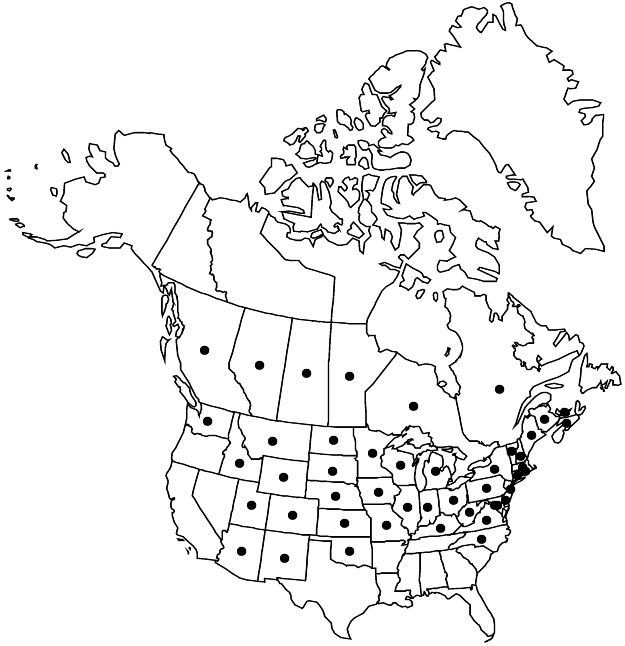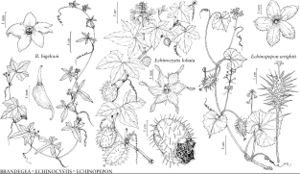Difference between revisions of "Echinocystis lobata"
Fl. N. Amer. 1: 542. 1840.
FNA>Volume Importer |
imported>Volume Importer |
||
| (6 intermediate revisions by 2 users not shown) | |||
| Line 13: | Line 13: | ||
}}{{Treatment/ID/Special_status | }}{{Treatment/ID/Special_status | ||
|code=F | |code=F | ||
| − | |label= | + | |label=Illustrated |
}} | }} | ||
| − | |basionyms={{Treatment/ID/ | + | |basionyms={{Treatment/ID/Basionym |
|name=Sicyos lobatus | |name=Sicyos lobatus | ||
|authority=Michaux | |authority=Michaux | ||
| + | |rank=species | ||
| + | |publication_title=Fl. Bor.-Amer. | ||
| + | |publication_place=2: 217. 1803 (as lobata) | ||
}} | }} | ||
|synonyms={{Treatment/ID/Synonym | |synonyms={{Treatment/ID/Synonym | ||
|name=Micrampelis lobata | |name=Micrampelis lobata | ||
|authority=(Michaux) Greene | |authority=(Michaux) Greene | ||
| + | |rank=species | ||
}} | }} | ||
|hierarchy=Cucurbitaceae;Echinocystis;Echinocystis lobata | |hierarchy=Cucurbitaceae;Echinocystis;Echinocystis lobata | ||
| Line 37: | Line 41: | ||
|elevation=0–2000 m | |elevation=0–2000 m | ||
|distribution=Alta.;B.C.;Man.;N.B.;N.S.;Ont.;P.E.I.;Que.;Sask.;Ariz.;Colo.;Conn.;Del.;D.C.;Idaho;Ill.;Ind.;Iowa;Kans.;Ky.;Maine;Md.;Mass.;Mich.;Minn.;Mo.;Mont.;Nebr.;N.H.;N.J.;N.Mex.;N.Y.;N.C.;N.Dak.;Ohio;Okla.;Pa.;R.I.;S.Dak.;Utah;Vt.;Va.;Wash.;W.Va.;Wis.;Wyo. | |distribution=Alta.;B.C.;Man.;N.B.;N.S.;Ont.;P.E.I.;Que.;Sask.;Ariz.;Colo.;Conn.;Del.;D.C.;Idaho;Ill.;Ind.;Iowa;Kans.;Ky.;Maine;Md.;Mass.;Mich.;Minn.;Mo.;Mont.;Nebr.;N.H.;N.J.;N.Mex.;N.Y.;N.C.;N.Dak.;Ohio;Okla.;Pa.;R.I.;S.Dak.;Utah;Vt.;Va.;Wash.;W.Va.;Wis.;Wyo. | ||
| − | |discussion=<p>Echinocystis lobata is sometimes cultivated in arbors for its showy white flowers (staminate) in long inflorescences. Its occurrence in the western United States is sporadic.</p> | + | |discussion=<p><i>Echinocystis lobata</i> is sometimes cultivated in arbors for its showy white flowers (staminate) in long inflorescences. Its occurrence in the western United States is sporadic.</p> |
|tables= | |tables= | ||
|references= | |references= | ||
| Line 46: | Line 50: | ||
-->{{#Taxon: | -->{{#Taxon: | ||
name=Echinocystis lobata | name=Echinocystis lobata | ||
| − | |||
|authority=(Michaux) Torrey & A. Gray | |authority=(Michaux) Torrey & A. Gray | ||
|rank=species | |rank=species | ||
| Line 60: | Line 63: | ||
|publication title=Fl. N. Amer. | |publication title=Fl. N. Amer. | ||
|publication year=1840 | |publication year=1840 | ||
| − | |special status=Endemic; | + | |special status=Endemic;Illustrated |
| − | |source xml=https:// | + | |source xml=https://bitbucket.org/aafc-mbb/fna-data-curation/src/2e0870ddd59836b60bcf96646a41e87ea5a5943a/coarse_grained_fna_xml/V6/V6_25.xml |
|genus=Echinocystis | |genus=Echinocystis | ||
|species=Echinocystis lobata | |species=Echinocystis lobata | ||
Latest revision as of 22:20, 5 November 2020
Leaves: petiole 1–4 cm; blade 2–8(–12) cm, lobe apex acute, sinuses rounded, surfaces glabrous or slightly scabrous, hair bases pustulate. Inflorescences: staminate racemes 8–14 cm; pistillate peduncles 2–5 cm. Flowers lightly fragrant; corolla 8–12(–16) mm diam. Pepos 3–5 cm, spinules 4–6 mm, glabrous or slightly scabrous. Seeds 12–20 mm. 2n = 32.
Phenology: Flowering May–Sep(–Oct).
Habitat: Bottomland forests and thickets, riparian woods, marshes and marsh edges, thickets in pastures, fencerows, ditches, lake shores, railroad banks, dunes
Elevation: 0–2000 m
Distribution

Alta., B.C., Man., N.B., N.S., Ont., P.E.I., Que., Sask., Ariz., Colo., Conn., Del., D.C., Idaho, Ill., Ind., Iowa, Kans., Ky., Maine, Md., Mass., Mich., Minn., Mo., Mont., Nebr., N.H., N.J., N.Mex., N.Y., N.C., N.Dak., Ohio, Okla., Pa., R.I., S.Dak., Utah, Vt., Va., Wash., W.Va., Wis., Wyo.
Discussion
Echinocystis lobata is sometimes cultivated in arbors for its showy white flowers (staminate) in long inflorescences. Its occurrence in the western United States is sporadic.
Selected References
None.
